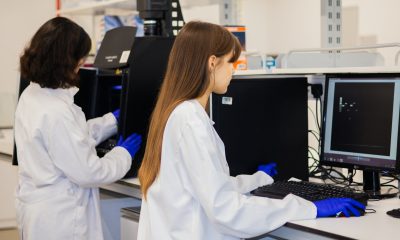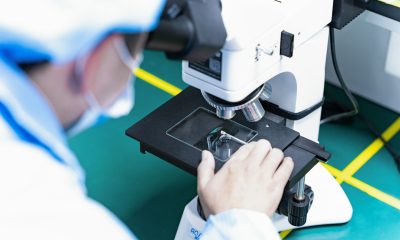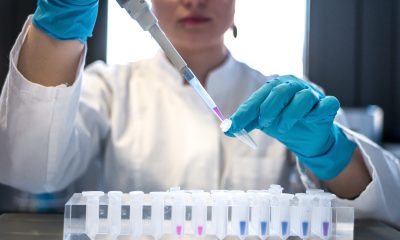Biotech
The Spanish Pharmaceutical Industry Increased Its Investment in R&D by 9% in 2021
More than 60% of the €1.27 billion allocated to R&D in 2021 was devoted to clinical trials (€789 million), where Spain plays a prominent international role, in addition to another €156 million for basic research, which represents a 23% increase in the resources allocated to this area compared to the previous year. Of the total investment in clinical trials, 35% went to early phases (phases I and II).

The innovative pharmaceutical industry present in Spain “has reached its highest level of investment in R&D ever,” as reflected in the latest R&D Activities Survey that Farmaindustria conducts each year among its associates. Thus, in 2021, R&D investment in the Spanish pharmaceutical industry exceeded €1.27 billion, which is 9.2% more than the previous year 2020, when the second-highest investment figure until then was reached, with €1.16 billion.
“This sector’s constant commitment to investment in R&D is reflected in the fact that already almost 20% of all industrial R&D carried out in our country is developed by the pharmaceutical industry. This represents more than 9% of the R&D carried out by the entire business sector in our country, and 6.1% of the total research of the Spanish economy, taking into account public and private research. The leading role played by our sector in research work, which is essential for drug development, is also an opportunity to attract international investment to the healthcare system, and therefore to the country, but also an opportunity for patients and for society as a whole, since participation in a clinical trial may be the only way out for certain serious patients,” emphasized the CEO of Farmaindustria, Juan Yermo.
Of the total investment in clinical trials, 35% went to early phases (phases I and II)
As reflected in the survey, more than 60% of the €1.27 billion allocated to R&D in 2021 was devoted to clinical trials (€789 million), where Spain plays a prominent international role, in addition to another €156 million for basic research, which represents a 23% increase in the resources allocated to this area compared to the previous year. This investment in clinical research carried out by the pharmaceutical industry has increased at an average annual cumulative rate of 5.3% over the last 10 years, rising from (€470 million) in 2011 to nearly €800 million in 2021.
Of the total investment in clinical trials, 35% went to early phases (phases I and II), the most complicated from the scientific point of view, which already account for more than half of the clinical trials (55%) currently underway in our country. This commitment has also materialized in a boost to research in the field of rare diseases so that 22% of the trials being developed in our country are already focused on orphan pathologies.
“This sustained investment effort by pharmaceutical companies over time, together with close collaboration with the Administration and regulatory agency, healthcare and research centers, the involvement of healthcare professionals, and the growing participation of patients, has allowed Spain to become one of the countries with the best conditions for hosting clinical trials, to the point that a third of all trials carried out in Europe already have Spanish participation, or that for some multinational companies Spain is the second country, after the United States, in terms of participation in trials”, highlights Yermo.
This investment in clinical research generates “a great virtuous circle since it involves investment in hospitals by the companies promoting the trials – 82% of which are driven by the pharmaceutical industry; it contributes to the qualification of healthcare professionals, thereby increasing the quality of the services provided by our healthcare system, and it opens up new possibilities for Spanish patients, for many of whom participated in a clinical trial can represent a unique opportunity to cure their disease”.
According to the survey data, in 2021 nearly half of the pharmaceutical industry’s total R&D investment (593 million) went to research projects with hospitals, universities and public and private centers, which is a key contribution for these centers and one of the greatest examples of public-private collaboration in this field in our country. The rest of the investment (674 million) was devoted to R&D activities carried out in the companies’ own research centers.
All the autonomous communities attracted investment in R&D by the innovative pharmaceutical industry, although the Community of Madrid (34%) and Catalonia (31%) accounted for more than half of the total investment in Spain. “It is important that there are more and more autonomous communities, more hospitals throughout the territory, that promote clinical research; this will mean more investment by companies, more healthcare professionals involved in cutting-edge research and more options for their patients,” says Farmaindustria’s CEO.
The Farmaindustria survey data show that nearly a third (31.8%) of total R&D investment in 2021 was in the field of biotechnology (€403 million). Specifically, 33% of innovative pharmaceutical companies use biotechnology or some tool of biotechnological origin in the preclinical phase and 57% in the clinical phase, while 90% of the laboratories that use biotechnology in the clinical phase develop all or part of these activities in Spain. As a result of this research, in the last 20 years, companies have marketed in Spain up to 72 biotechnological drugs of biological-recombinant origin, mainly in the areas of oncology, hematology, and immunology.
The survey also highlights the strategic importance that the innovative pharmaceutical sector represents for the Spanish market in terms not only of productivity and stimulation of R&D, but also of quality employment, a key aspect in guaranteeing the development of new drugs and ensuring the competitiveness of pharmaceutical companies in our country. Thus, direct employment of Farmaindustria’s member companies in research and development tasks grew by 6.5% in 2021 and reached 5,393 people, which is, also in this area, a new record high.
Added to this is the high qualification of the pharmaceutical industry’s research personnel, which continues to be one of its main distinguishing features: 9 out of 10 (89.6%) of those more than five thousand researchers are university graduates (undergraduates, graduates, and doctors). Also, according to the latest data from the National Statistics Institute (INE), two-thirds of the total number of R&D employees are women (3,600), which means that one out of every four female researchers in the Spanish industrial sector currently comes from pharmaceutical companies.
“This high level of preparation of our professionals is a differentiating element with respect to other sectors. Quality employment is synonymous with wealth for countries. If we add that employment in innovative pharmaceutical companies is, for the most part, indefinite and egalitarian, we have the ideal equation to consider the pharmaceutical industry as a strategic sector for Spain,” Yermo stressed.
To conclude, the general director of Farmaindustria stressed that “the pharmaceutical industry has the structure, experience, results, and disposition to continue growing and consolidate Spain’s position as a reference in clinical research. A strategic plan for the country, with the right regulatory framework for the industry to grow, will allow us to do so. We are currently working with the Spanish government to define a Strategic Plan for the Pharmaceutical Industry based on three pillars: patient access to medicines, biomedical R&D, and the development of a new pharmaceutical industry that will enable the industry to continue to grow and consolidate Spain’s leading position in clinical research. A strategic plan for the country, with the right regulatory framework for the industry to grow, will allow us to do so. We are currently working with the Spanish government to define a Strategic Plan for the Pharmaceutical Industry based on three pillars: patient access to medicines, biomedical R&D and drug production, and the resilience of the supply chain,” said Yermo.
__
(Featured image by tommyvideo via Pixabay)
DISCLAIMER: This article was written by a third party contributor and does not reflect the opinion of Born2Invest, its management, staff or its associates. Please review our disclaimer for more information.
This article may include forward-looking statements. These forward-looking statements generally are identified by the words “believe,” “project,” “estimate,” “become,” “plan,” “will,” and similar expressions. These forward-looking statements involve known and unknown risks as well as uncertainties, including those discussed in the following cautionary statements and elsewhere in this article and on this site. Although the Company may believe that its expectations are based on reasonable assumptions, the actual results that the Company may achieve may differ materially from any forward-looking statements, which reflect the opinions of the management of the Company only as of the date hereof. Additionally, please make sure to read these important disclosures.
First published in diariofarma, a third-party contributor translated and adapted the article from the original. In case of discrepancy, the original will prevail.
Although we made reasonable efforts to provide accurate translations, some parts may be incorrect. Born2Invest assumes no responsibility for errors, omissions or ambiguities in the translations provided on this website. Any person or entity relying on translated content does so at their own risk. Born2Invest is not responsible for losses caused by such reliance on the accuracy or reliability of translated information. If you wish to report an error or inaccuracy in the translation, we encourage you to contact us.

-

 Business2 weeks ago
Business2 weeks agoTopRanked.io Weekly Affiliate Digest: What’s Hot in Affiliate Marketing [Hosting.com Affiliates]
-

 Africa3 days ago
Africa3 days agoAir Algérie Expands African Partnerships
-

 Crypto1 week ago
Crypto1 week agoEthereum Pushes AI Integration With ERC-8004 and Vision for Autonomous Agents
-

 Business5 days ago
Business5 days agoDow Jones Near Record Highs Amid Bullish Momentum and Bearish Long-Term Fears
























